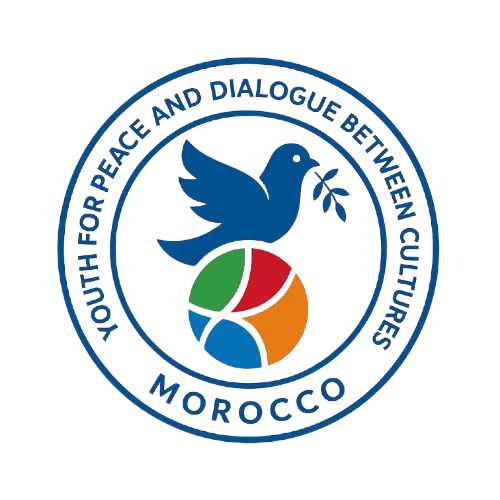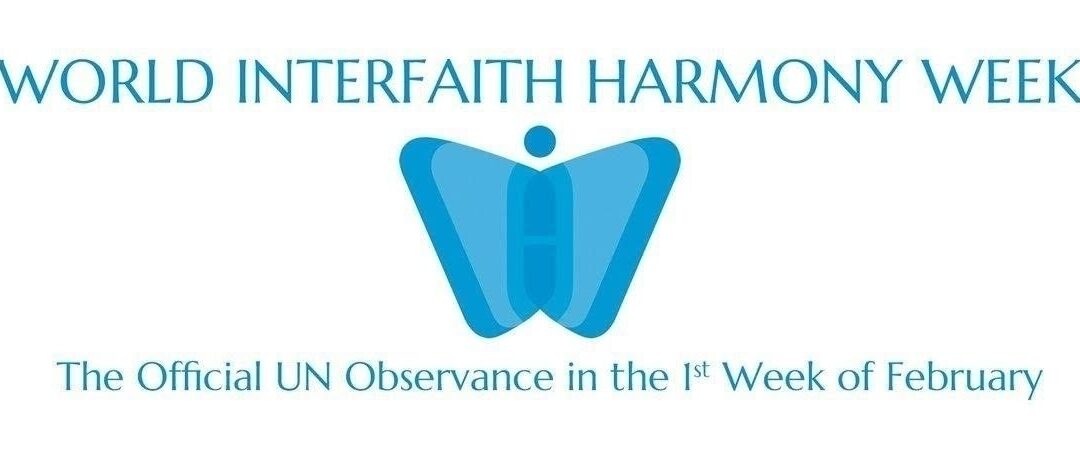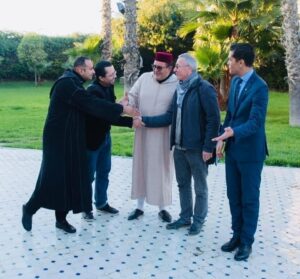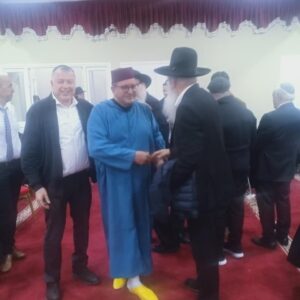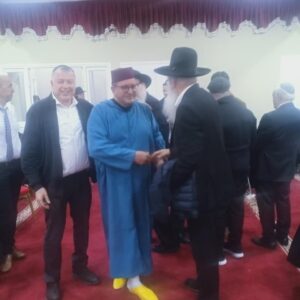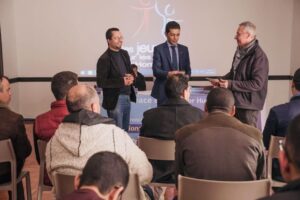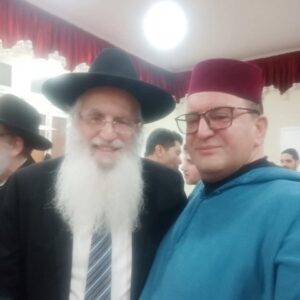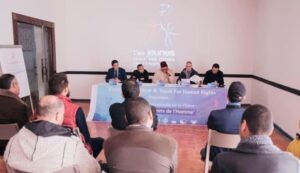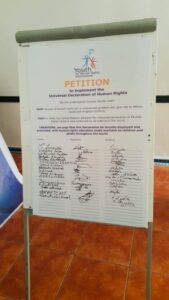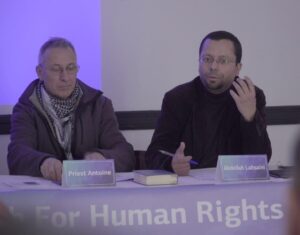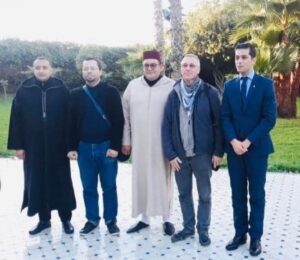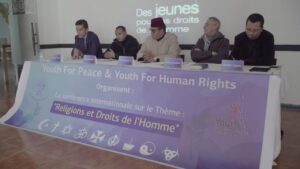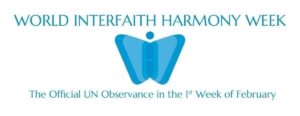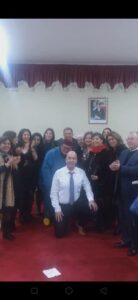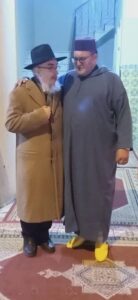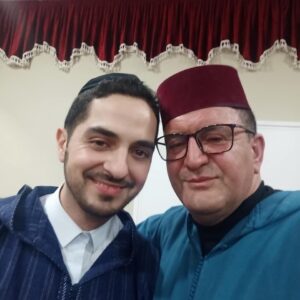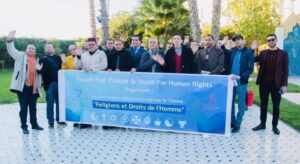In the context of celebrating the World Interfaith Harmony Week 2020, the association of youth for peace has organized an international symposium about religions and human rights.
‘’One of the most important and difficult challenges facing the world today in the field of human rights is closely related to religion and belief. The lack of respect and failure to protect the freedom of conscience, the problem of religious intolerance, inciting religious hatred, as well as the widespread of misunderstandings on the nature of the relationship between religion and global freedoms all play a part in hindering the progress towards making the culture of human rights a reality in our societies’’.
Youth for Peace and Youth for Human Rights International organized an international symposium on Religions and Human Rights in the Interdisciplinary Hall at the Ibis Hotel in Oujda. The seminar was moderated by Mr. Abdullah Lahsaini: Vice-President of the Youth for Peace Association and researcher in comparing religions. The seminar was attended by the head of the Church of Saint Louis Boujdah (Kerry Antoine). And the representative of the Imam Al-Junaid Center for Specialized Sufi Studies and Research of the Muhammadiyah Association for Scholars, Dr. Mustafa Bouzgheba, researcher at the Imam Al-Junaid Center for Specialized Sufi Studies and Research, with the title: Peaceful Coexistence in Our Contemporary Reality – A Sufi Reading-. And doctor Mohsen Al-Arousi who is interested in the Jewish history of the city of Oujda.
Professor Zakaria El Hamel: President of the Youth for Peace Association, the Ambassador of Peace in Morocco, and Director of the Executive Office of the Youth Association for International Human Rights (Morocco) premised the activity as the chair of the session. Where he reminded of the aim of the activity, and stated that it falls within the annual tradition that was launched by His Majesty King Abdullah II of Jordan on interfaith harmony, which is based on the foundations of love of God and love of neighbor.
This activity has included attending intellectual, collective, and human rights activists, which contributed to enriching the discussion on a crucial topic centered on tolerance between religions and the promotion of human rights. The lectures’ interventions revolved around the idea of coexistence between the Islamic and Jewish religions, and Reverend Antoine presented evidence from His Majesty King Mohammed VI’s speech upon his reception The Pope agreed that freedom of conscience and work to make religions a source of harmony and stability, as priest Antoine began his intervention on the legitimacy of human rights in religion by talking about the story of Abel and Cain in the Torah (the Old Testament) and mentioned that the Lord who interfered in the story of the death of Ibn Ad The killer and asked about his brother is evidence of the interest of Christian and Jewish religions in human rights.
He mentioned verses in the New Testament about the Lord’s saying while holding some sinners accountable on the day of judgment ‘’I was a stranger and you did not invite me in, I needed clothes and you did not clothe me, I was sick and in prison and you did not look after me? Only to answer after people,s bewilderment that a man,s illness and exigency is that of the god’’ which goes to show that the right for care, medicine and life is the in the core of Christianity.
He furthermore recited some verses from the Quran, such as : ‘’Help ye one another in righteousness and piety, but help ye not one another in sin and rancour’’ and “O mankind, We have created you male and female, and appointed you races and tribes, that you may know one another” and he added that solidarity and humanitarianism is at the heart of the Qur’an’s concern. Thus, human rights are an inherent concept in the Islamic religion.
Reverend Antoine mentioned his experience about the joint prayer between Muslims and Christians, as he dedicated a part of the church to Muslims for prayer. One day it coincided that Muslims prayed on one side of the church at a time when the latter was holding a religious service, which made the euphonious prayers create a wonderful neighborhood of religious harmony.
He also mentioned the works of righteousness that his church performs for the needy without regard for their faith. He mentioned the condition of a sick Muslim who had been under his care for a long time and when the patient died, priest Antoine followed him to the mosque only to be disappointed that some of the muslim worshipers denied his entery to the mosque, which was considered a scratch in the character of tolerance. He also spoke about the Pope’s visit to Morocco and his speech while accompanied with his Majesty King Mohammed VI, and their affirmation of freedom of conscience. In parallel, a documentary film was presented showing the historical context of the human rights charter, in light of the wars that humanity has gone through, which has struck and continues to afflict the lives of innocent people and civilians.
In his intervention d. Mustafa Bouzagheba, a researcher at the Imam Al-Junaid Center for Specialized Sufi Studies and Research of the Muhammadiyah League of Scholars, said that the world today knows conflicts and struggles due to fear from the other. It desperately needs doses of love to extinguish the fire of hatred, and sufism for all it carries of values of beauty to make humanity return to its common sense that is based on security, safety, and peace. While Rabbi Abraham Toledano, who was born in the city of Meknes (a Moroccan city and one of the four imperial cities. Located in the north of the Kingdom of Morocco on the Sais Plateau, 140 km east of the capital Rabat), currently resides in Paris France, a religious guide for the Jewish religion in Morocco confirmed that Moroccan Jews are estimated in thousands. Most of them left Morocco in the sixties of the last century, but they return to it every time in the season of “Helula” or the “pilgrimage” season. He said that we are now in the city of Oujda to celebrate the tremors of the righteous guardian, Rabbi Cohen Sabar Sakly and a number of Moroccan Jews who visit these holy places, the season of Helula, is considered an opportunity to link the womb with their mother country, and also to renew their association with Morocco.
(… and the celebration of Moroccan Jews coinciding with the reverence of Rabbi Cohen Sabar Sakaly coincided with the occasion of the week of interfaith harmony as a humanitarian need in the time of terrorism and racism and in recognition of the Moroccan model in the field of peace and tolerance …) Added Zakaria El Hamel.
The works of this activity concluded with an educational tape that introduced human rights targeting groups of children and youth all over the world, to promote their values of tolerance and peace.
